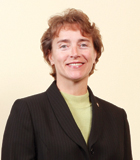
Talking to Blanche Lincoln is more like chatting with a friendly neighbor from down the street than a powerful U.S. senator. The moderate Democrat talks with ease about her small-town Southern upbringing, her parents and ordinary things, such as preparing supper for her 12-year-old twin boys, Reece and Bennett.
“My call will come here in an hour from my house wanting to know what’s for dinner,” the two-term senator notes casually from her office in Washington. “We had spaghetti last night.”
Her personal, genuine demeanor has won over many in her state, including her constituents in long-term care.
“She’s a senator, she’s a mother, she’s a person,” says Randy Wyatt, head of the Arkansas chapter of the American Health Care Association admiringly. “Blanche Lincoln is somebody I am proud represents Arkansas and its people, as well as, if not better, than anybody else I know.”
Still, don’t let the “girl next door” persona fool you. The youngest female ever to be elected to the Senate in 1998, this woman has serious clout, serving on the powerful Finance Committee.
Her legislative work on behalf of long-term care has impressed many, including Dr. Larry Wright, director of the Schmieding Center for Senior Health and Education in Northwest Arkansas. In 2006, the center honored Lincoln as a distinguished lecturer.
She is “unique nationally in that when it comes to long-term care, she gets all the issues,” Wright said. “You don’t have to educate her. She is always on top of those.”
Those issues range from education of caregivers, to improving the lives of seniors, to a new competitive bidding process for durable medical goods, the last a sore spot for those in long-term care.
In 2006 and 2007, she, along with other senators, introduced the Long Term Care Quality and Modernization Act. Touted by the American Association of Homes and Services for the Aging as landmark legislation, the bill would promote investment in capital improvements and health information technology. It also would encourage collaboration between nursing home providers and surveyors, and assist in the creation of a stable and well-trained workforce.
For Lincoln, who is also a member of the Senate Special Committee on Aging, looking after the elderly is simply what one does. It was a part of her life growing up in the Mississippi Delta of Arkansas, where her dad was a rice farmer and her mother was a homemaker. She and her cousin would deliver homemade meals to her grandparents who lived a few doors down. Her mother’s mother lived with her family at the end of her life.
“It’s something that is either instilled in you or it isn’t,” says the senator, whose husband’s grandmother happens to be 111. “These are people who have made it possible for you to enjoy the life that you enjoy … They’ve devoted their lives to serving their families and their communities and their country, and it was important then to be there for them. And it’s important now, now that I’m in a place where I can really fight for them.”
Her biggest concern is that not enough is being done to train caregivers for the wave of baby boomers who will soon start hitting 65. She believes in more geriatric education for caregivers “because we know the outcome is better … Even just a little bit of training makes all the difference in the world in terms of the care they can give.”
A personal experience with long-term care has further fueled her desire to advocate on the industry’s behalf. Her father, who was diagnosed with Alzheimer’s, died at home five years ago.
Of course, fighting for causes is only her day job. Her family is another. In her free time, she likes to spend time outdoors with her sons and husband, Steve, a physician. A fan of “Antiques Roadshow” on PBS, she says her guilty pleasure is yard sales.
Still one of only a few women in the Senate, she believes the time will come when a woman will be a commander in chief. So could it be her?
“Oh, Lord, no,” says Lincoln, laughing.
Her hungry boys await.
_____
Resume
1982
Graduates with degree in biology from Randolph-Macon Woman’s College in Lynchburg, VA
1992
Becomes member of U.S. House of Representatives. Pregnant with twins, opts not to stand for another re-election in 1996
1998
Elected to U.S. Senate
2001
Becomes the third woman ever to sit on the Senate Finance Committee
2006
Co-introduces the Long Term Care Quality and Modernization Act of 2006. Introduced again in 2007
2007
Sponsors a bill that would establish nationwide system of background checks for long-term care workers
From the October 01, 2008 Issue of McKnight's Long-Term Care News




